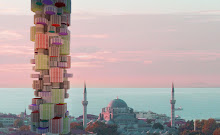The decision to try Khalid Shaikh Mohammed, the self-described mastermind of the September 11 attacks, in New York City – just blocks away from the site of the World Trade Center – has sparked a tremendous debate in the city and nationally. This debate has focused upon issues of rule of law and security, in particular whether civilian courts can prosecute complex terrorism cases and handle confidential information without compromising security. Those in support of civilian trials in New York City argue that the city has handled high-profile terrorism cases in the past and that the justice system is capable of fulfilling the task. Those opposed to civilian trials believe that military commissions are still the best medium to try terrorist suspects. An absent, yet equally important aspect of the debate is: what is the more appropriate medium to help American society grapple with the mass atrocity that was 9/11?
David Filipov looks for a picture of his father, Al Filipov, at the Tribute WTC Visitor Center in New York City. (Image by Scott Lewis)
Such questions have been explored in many other countries in their attempt to deal with mass violence and human rights violations, referred to often as transitional justice. Trials are a prominent component of transitional justice, and decisions on where to hold trials are usually based on two key considerations: where the capacities lie and where the trials are likely to have the most impact. International tribunals for the Former Yugoslavia and Rwanda, for example, were set up in the Netherlands and Tanzania to prosecute crimes committed during the violent conflicts in the Former-Yugoslavia and Rwanda in the 1990s. These tribunals were situated in a different place from where the crimes were committed in large part because domestic judicial systems at the time were weak. In addition, it was feared that the domestic climate at the time would not allow for safe and fair trials. The international tribunals, while rich in judicial capacity, have however been criticised for failing to resonate with local populations. Their distance rendered the trials physically and financially inaccessible to the vast majority who suffered from the violence. Rather then participating in these acts of justice and in so doing, possibly experiencing some form of healing, international trials were often seen as a foreign abstraction. In both the Former-Yugoslavia and Rwanda, some trials have subsequently taken place through domestic justice systems. In Rwanda, accused have also been held accountable through traditional justice systems. Many would argue that localising justice has been an important factor in the process of survivors coming to terms with atrocities.
In discussions about 9/11 trials, this important issue of impact and resonance has been missing. The question of whether justice conducted locally may play a role in healing survivors has not been asked. The prime focus has been on rule of law and capacities – whether a military commission or a civilian commission is most capable of handling the cases. Guantanamo Bay, where Khalid Shaikh Mohammed (and four accused co-conspirators also designated for trial in New York City) have been held is critiqued primarily for digressions from due process and rule of law. Concerns over the applicability of Guantanamo have rarely centred upon whether the system there resonates with Americans or is perceived as distant and abstract. Although family members of those who died on 9/11 could apply to win a lottery to attend proceedings at Guantanamo, these were rare to come by and disempowering for the many who were not selected. By and large, the processes and occurrences there have been shrouded in secrecy. Civilian trials in New York City would open the process. New Yorkers and all Americans affected by 9/11 would have greater ability to sit in the courtroom and witness proceedings. Trials could also be broadcast, at least in part, by local and mass media – reaching countless more people than the military proceedings in Guantanamo.
Most commentators that touch on the potential impact of local trials on New Yorkers stress, however, only the potential negative effects of Americans reliving the trauma and the risk of a media circus. These experiences will undoubtedly be difficult and painful, as they have been in other countries overcoming mass violence. Some New Yorkers may feel that it is too soon to have the trials so close to home, while others may think that it is time to confront this past. Whichever the view, it is indeed time to ask these questions and to extend the debate on civilian versus military trials, New York City versus Guantanamo beyond the lens of rule of law and security to issues of healing.
**This article was written by Huma Haider, a New York State attorney who worked in the Prosecution Support Section of the War Crimes Chamber, State Court of Bosnia and Herzegovina in 2007.





























No comments:
Post a Comment